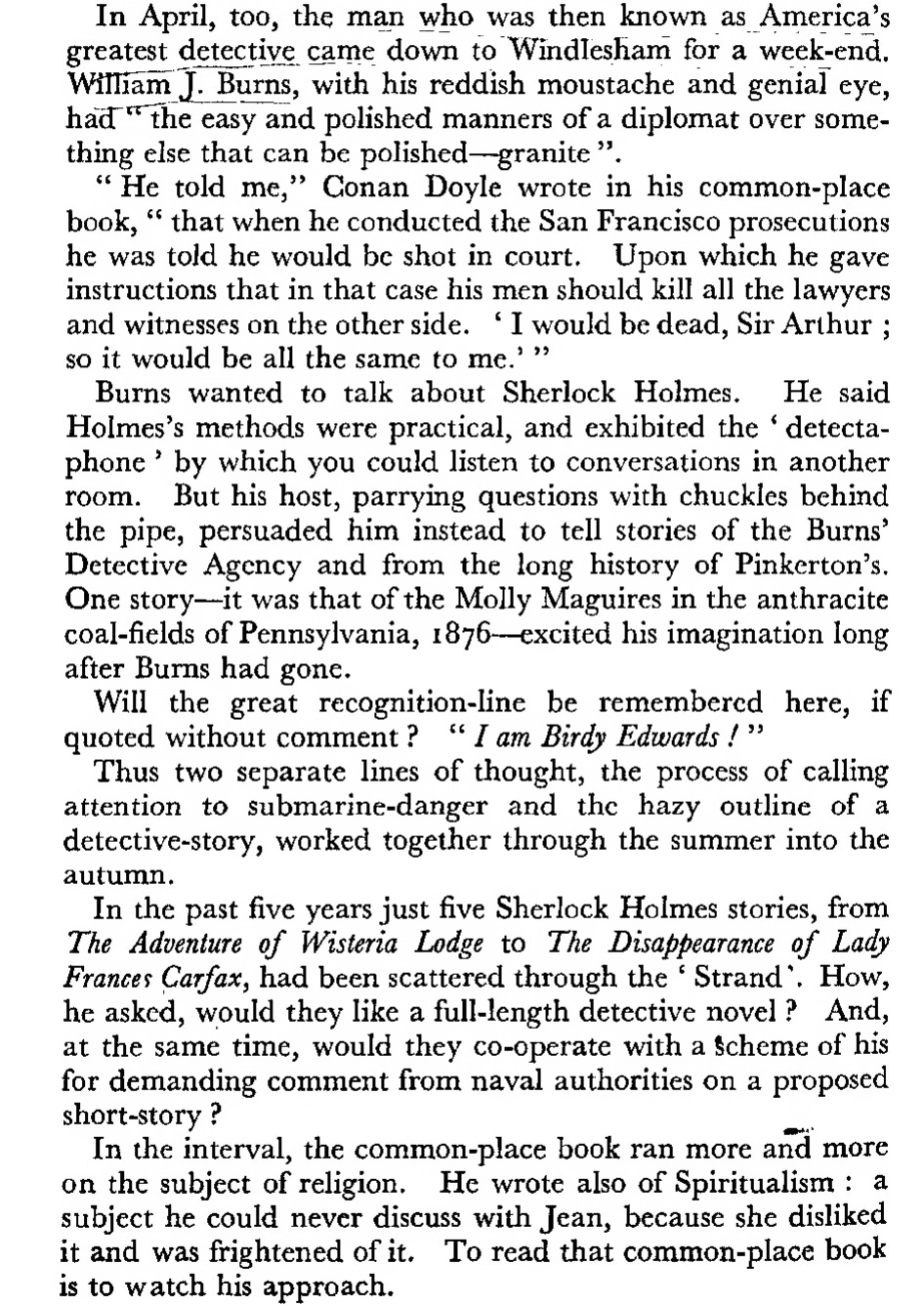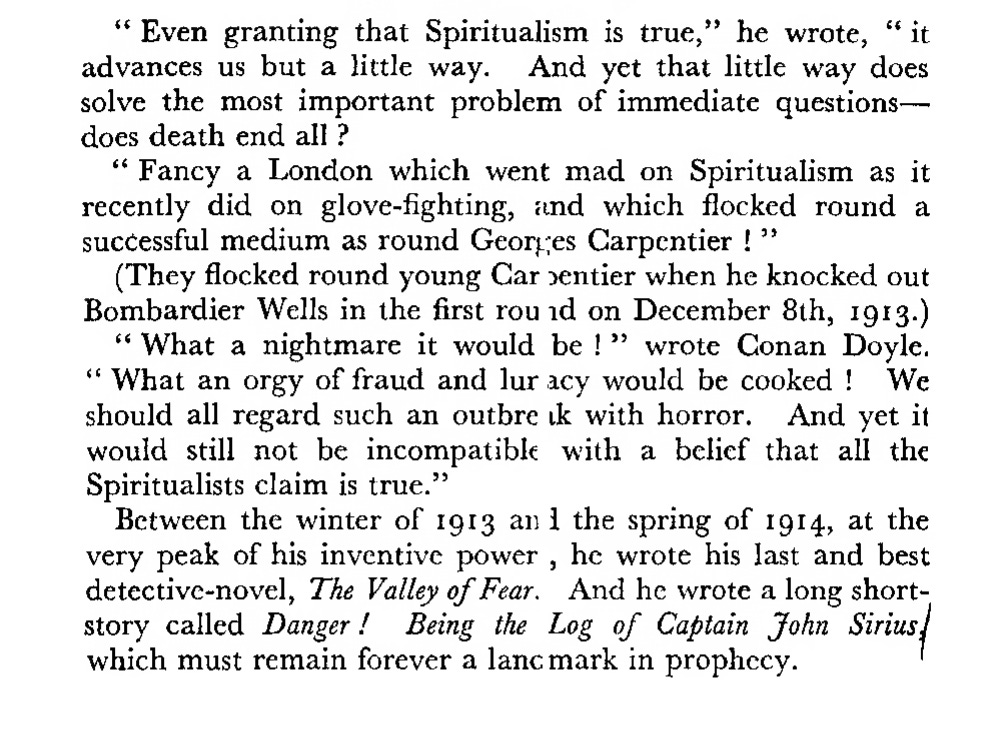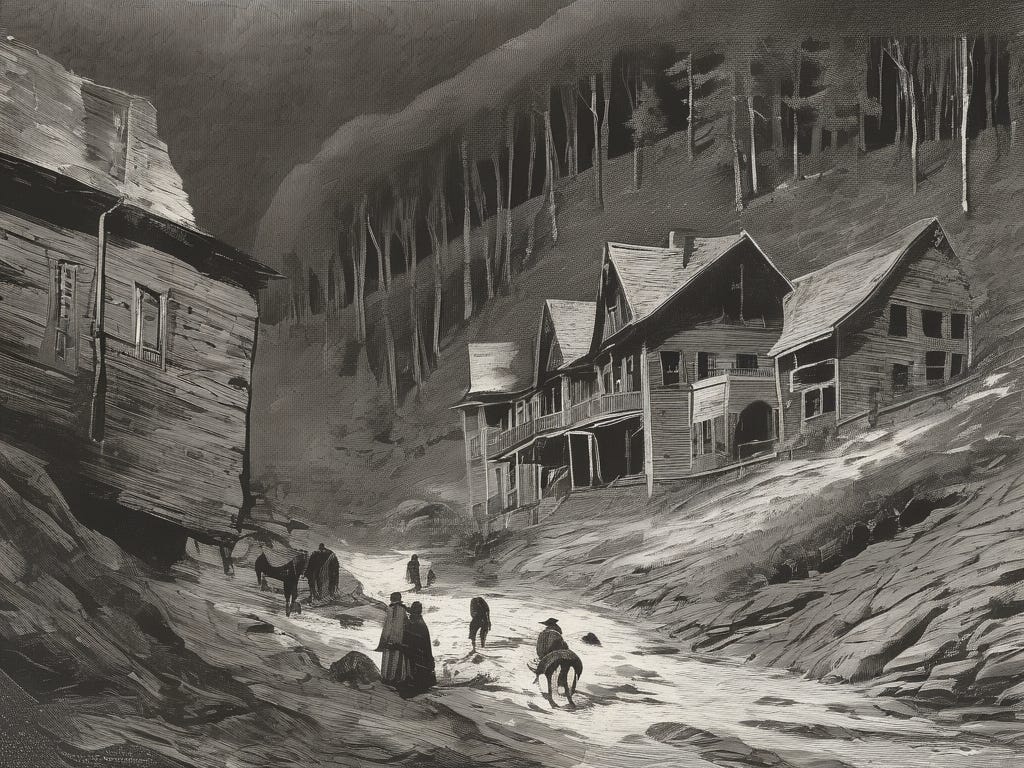[Revised] The Valley of Fear (1915) by Sir Arthur Conan Doyle
An instance of transatlantic organized crime fiction?
Published in 1915, the action in They Valley of Fear precedes "The Final Problem."
Sherlock Holmes is asked to consult on a 6 January shotgun murder at a moated manse in Sussex. The victim, John Douglas, was a wealthy US expatriate. Mrs. Douglas and the American's friend Cecil Barker don't seem upset about it. And, a dumbbell is missing from a set at the residence, Birlstone Manor House
Inspector MacDonald and Sergeant White Mason pursue a number of clues, implementing a nationwide manhunt for the killer.
At the halfway point in the novel, Holmes presents his deductions and solves the case.
But the fun has just begun.
The second half of They Valley of Fear takes us back twenty years, to 1875 in the Vermissa Valley of the US. This section is written in third person, though we already know the manuscript's source.
The plot of this narrative anticipates Dashiell Hammett's novel Red Harvest (1925). The Vermissa Valley is an early "Poisonville." John McMurdo, new to the valley, joins the Scowrers, an organized crime gang that extorts small businesses and large corporations that own the valley.




This second phase of They Valley of Fear is compelling, suspenseful, and violent. As well as looking forward to Red Harvest, we can also see its influence on everything from middle period Ellery Queen to at least half the adventures of Jack Reacher, full of multiform riffs on the "Yojimbo" topos.
* * *
The Valley of Fear begins with a showing-off curtain-raiser, very domestic. Holmes receives a coded message from a mole in the commanding heights of Moriarty's nation-spanning organization: code name, Porlock.
Our lads commence decoding from scratch, since Porlock subsequently decided it was too dangerous to send his book code's key.
The back-and-forth, deducing the correct book to use for decoding, is a more serious mystery than the curtain-raiser in "The Sign of Four," wherein Holmes reconstructs/profiles Watson's dipsomaniacal brother from abuse inflicted on the man's pocket watch, which Watson inherited.
Just as the Porlock cipher is successfully decoded
"....'There is danger—may—come—very soon—one.' Then we have the name 'Douglas'—'rich—country—now—at Birlstone—House—Birlstone—confidence—is—pressing.' There, Watson! What do you think of pure reason and its fruit? If the green-grocer had such a thing as a laurel wreath, I should send Billy round for it.”
Inspector MacDonald of Scotland Yard -- who has received his own note regarding danger at Birlstone -- arrives. This is a show-stopping use of coincidence. It registers that the U.S. scowrers gang has hired Moriarty's organization to assassinate expatriate police spy John Douglas.
In the novel's final pages, Holmes and Douglas's comrade Cecil Barker discuss the international aspect of Douglas's actual asassination:
“....These infernal Scowrers, this cursed vindictive nest of criminals—”
“No, no, my good sir,” said Holmes. “There is a master hand here. It is no case of sawed-off shotguns and clumsy six-shooters. You can tell an old master by the sweep of his brush. I can tell a Moriarty when I see one. This crime is from London, not from America.”
“But for what motive?”
“Because it is done by a man who cannot afford to fail, one whose whole unique position depends upon the fact that all he does must succeed. A great brain and a huge organization have been turned to the extinction of one man. It is crushing the nut with the triphammer—an absurd extravagance of energy—but the nut is very effectually crushed all the same.”
“How came this man to have anything to do with it?”
“I can only say that the first word that ever came to us of the business was from one of his lieutenants. These Americans were well advised. Having an English job to do, they took into partnership, as any foreign criminal could do, this great consultant in crime. From that moment their man was doomed. At first he would content himself by using his machinery in order to find their victim. Then he would indicate how the matter might be treated. Finally, when he read in the reports of the failure of this agent, he would step in himself with a master touch...."
* * *
Do criminal gangs in one country hire a gang in another country if they are better situated to complete the initiating gang's vendetta? Or is this a dramatic convention merely a cop cliché introduced once a year when budget requests come up for review?
In "The Godfather" (1972) Michael is sent to Sicily after assassinating Sollozzo and McCluskey; he is under the "protection" of an international ally of his family. The protection does not last long. The vendetta of the Tattaglia family is powerful enough to subborn one of Michael's bodyguards.
One more film example: a Mexican cartel exports a vendetta against two LAPD cops to a gang of -- perhaps? -- supernaturally powerful Los Angeles cultists to exact reprisal in "End of Watch" (2012).
My knowledge of internationally allied crime groups in fiction is nil, but I hope these two movie examples may suffice. Subcontracted cross-border criminal gang vendettas are a reliable and recurring plot gimmick. Today, borders are nicely porous when the needs of business are concerned. Not so much when the commodities seeking passage are laborers.
* * *
Mr. Dickson Carr discourses
In his superb 1949 biography The Life of Sir Arthur Conan Doyle, John Dickson Carr writes:
(Dickson Carr 278)
(Dickson Carr 279)
(Dickson Carr 282)
(Dickson Carr 283)
* * *
They Valley of Fear is the strongest crime novel written by Conan Doyle. I used to be skeptical of this assessment by John Dickson Carr. After finishing the novel today, I am convinced.
Jay
31 December 2023; Revised 6 January 2024
Carr, John Dickson. The Life of Sir Arthur Conan Doyle. John Murray, 1949.
Doyle, Arthur Conan. The Valley of Fear. Penguin Classics, 2014










We can see here Doyle trying to give the public what they wanted from him (Holmes) while at the same time working in new territories. He was a far more prolific writer than people who only know him for Holmes would assume, and he wasn't afraid of a literary challenge.